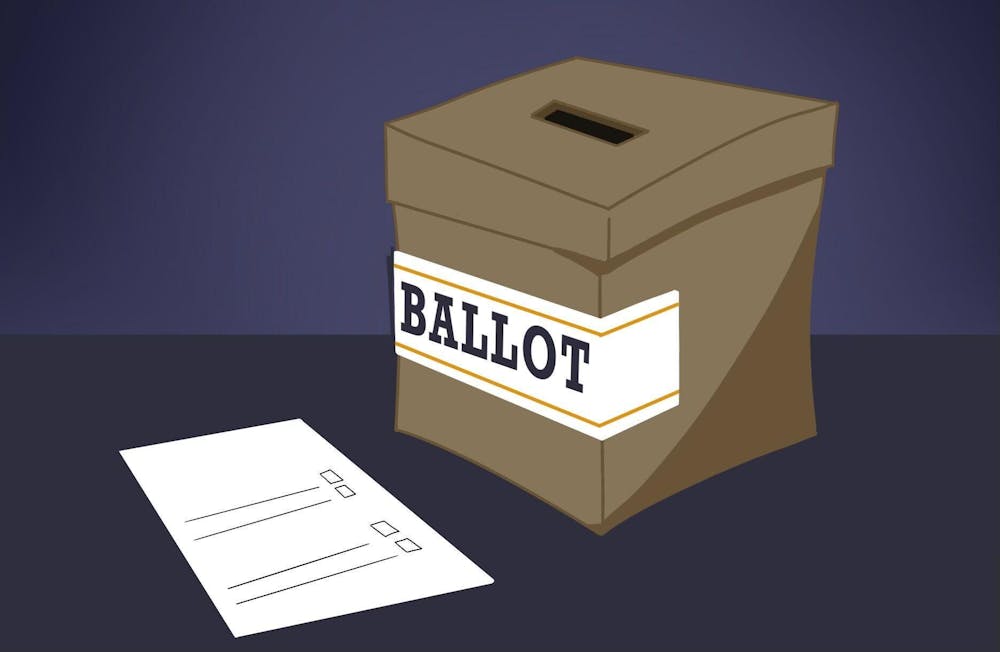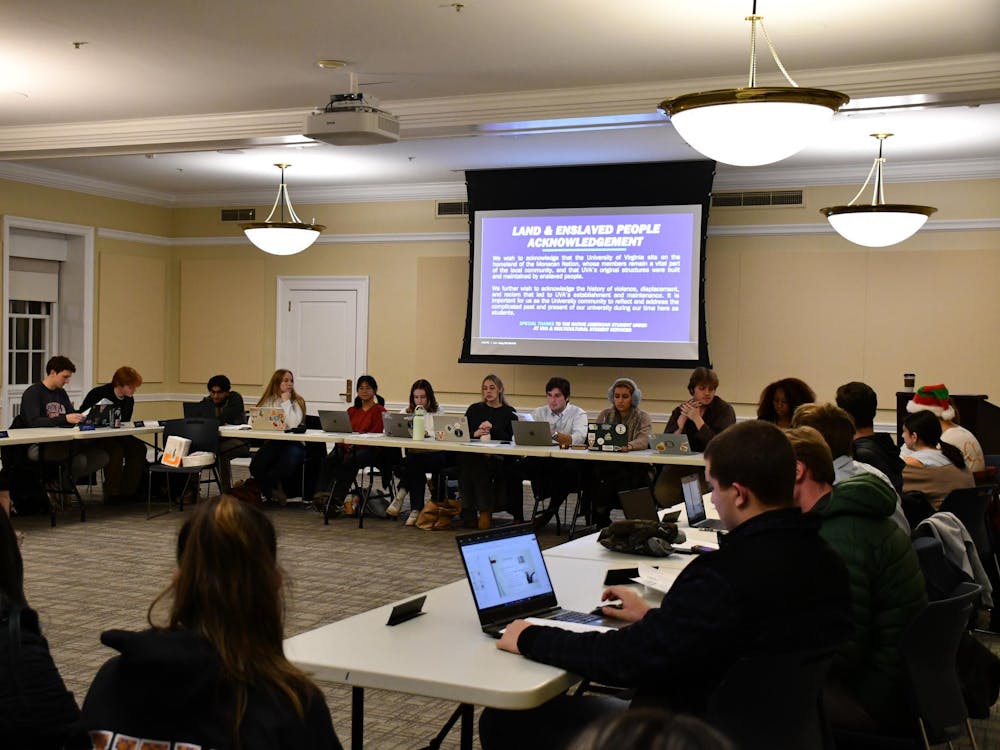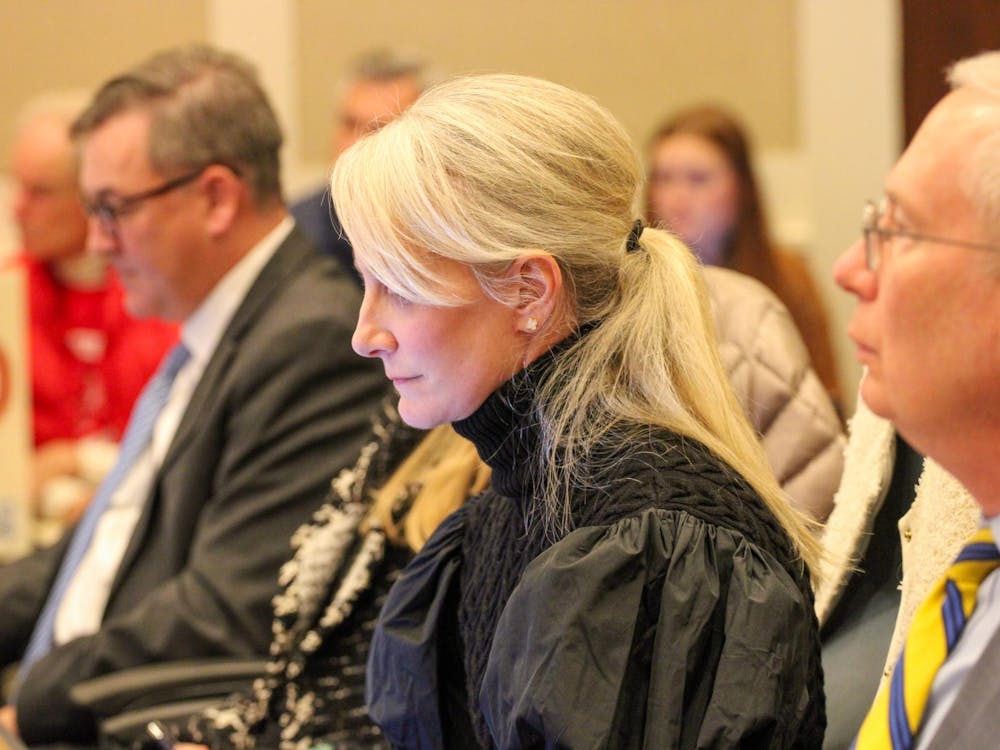While conducting its annual New Student Elections, The University Board of Elections released a link to a voting ballot Oct. 7 that omitted several eligible candidates from the options. Upon discovering this mistake, the UBE sent out a new ballot in which several races were not conducted through ranked choice voting as required by UBE policy, necessitating a runoff election to choose the winners for four NSE races.
In the 2024 NSE ballot, an annual set of elections for new students on Grounds, eligible students could vote for candidates in seven separate races — First Year Council President, FYC Vice President, Student Council First Year Representatives, Student Council Transfer Student Representative, Student Council Undergraduate International Student Representative, Graduate International Student Representative and UJC Data Science Representative.
The initial NSE ballot that failed to include several candidates’ names was withdrawn the same day of its release. The UBE announced the withdrawal of this ballot in an email to all students noting the mistake and providing a corrected 2024 NSE Elections voting link — this time with all candidates’ names on the ballot. The email encouraged all students to vote and revote using the new link provided and stated that the UBE did not believe restarting the vote would unfairly sway the election based on the number of votes cast at the time that the ballot was withdrawn.
The second ballot sent to students also contained an error, with four elections not conducted through ranked choice voting — a system where voters rank candidates in order of their preference instead of simply selecting one — which is required per UBE policy. This mistake ultimately led to the UBE holding a runoff election for those four positions.
According to Zach Lederer, UBE chair and fourth-year College student, the omission of candidates’ names from the initial voting link stemmed from an error in the candidate registration process, when all candidates were required to fill out an online form to register their candidacy. The application did not register all candidates who filled out the form, resulting in several names being left off of the original ballot, Lederer said.
“[Several candidates] had done all the proper steps, but they were erroneously removed from the form,” Lederer said. “When we ended up finding out, we were still able to find their data and just put it back up on the ballot. Ultimately, because votes had already been cast, the decision was made to withdraw that initial ballot, [include] the few candidates who were missing from it and restart the voting to create a much better shot for everyone.”
Manuela Kodwo, first-year College student and newly elected First Year Council representative, stated that she was concerned this error in the voting ballot might deter students from voting, especially for a second time. According to Kodwo, the UBE paused voting before withdrawing the initial ballot, which resulted in several students reaching out to Kodwo asking why they were unable to vote. Kodwo said she appreciated the UBE email announcing the errant ballot, but stated that she was nervous that it might have affected her election chances.
“When I saw the second ballot … I was a little disappointed because in any election you want stability and consistent results,” Kodwo said. “I was kind of scared that maybe people wouldn't vote again the second time around, and that could lower my chances [to win]. So I told as many people as I could that they have to vote again. I just wish that this error didn’t happen in the first place.”
Upon release of the second voting link, the UBE learned that several races were not being conducted through ranked choice voting which is required by UBE policy. According to a statement concerning NSE posted on the UBE website, the UBE considered either withdrawing the voting ballot again and restarting the election or choosing the winner based on which candidate received the most votes.
However, the UBE said they ultimately decided that holding a runoff election for the top two candidates in each of the affected races was the fairest way to proceed given UBE rules and restrictions.
“The election rules that are set on our website cannot be altered midway through the election. So procedurally, our hands were tied,” Lederer said. “The UBE does have the power to call a special election … so for races that were supposed to be ranked choice, but did not have over 50 percent of the vote go to one particular candidate, we decided to move on [with a] runoff.”
The ballots for the NSE runoffs included four races — FYC President, FYC Vice President, Student Council Transfer Representative and Graduate International Student Representative. As these races did not have candidates who received over 50 percent of the votes required to win in a ranked choice voting election, they were therefore subject to a runoff election. This runoff election consisted of an additional voting period from Oct. 16 to Oct. 18 for the top two candidates in each of the four races. The runoff election concluded over a week after voting was initially slated to finish Oct. 9.
Lederer said he attributes this error to a miscommunication between the UBE and a third party polling platform, BigPulse. He said the FYC Representative race differs from other races, as there are three winners and voting must be conducted using a first past the post ballot — a procedure in which voters can only select a single winner rather than ranking candidates in order.
According to Lederer, the UBE reached out to candidates affected by this error who raised several concerns about the decision to conduct a runoff election — most notably, he said students were concerned about the stress and costs of the additional campaigning period that would accompany another election. In response to this feedback, the UBE suspended campaigning over Fall Reading Days from Oct. 12 to Oct. 15 in order to give candidates a break from campaigning while many students were away from Grounds.
The UBE also offered all candidates $75 in reimbursement for campaign spending, as well as equal opportunity to advertise on UBE social media. According to Sahasra Molleti, newly elected FYC president and first-year College student, this reimbursement, though helpful, did not cover the cost of her campaign due to the intensified and elongated campaign process for the runoff election after a four day pause.
Molleti put up flyers, posted on social media, handed out ice cream and Raising Cane’s takeout and tabled for nine hours Oct. 17 to encourage prospective voters to vote in the runoff election.
“We did all these activities prior [to the first election], but once it got to the runoff, we did this times two,” Molleti said. “So it's been a very high commitment thing … because it was just one-on-one versus another candidate, we put in a full effort.”
The UBE released the results of the runoff election Oct. 19. Molleti was selected as FYC president, her running mate first-year College student Hayden Matay was selected as FYC vice president, third-year College student Tracie Artis was selected as Student Council transfer representative, and Graduate Business student Ashutosh Pandey was selected as graduate international student representative.
Despite some individuals having to vote multiple times over the course of the election, the runoff saw a higher voter turnout than the original election in three of its four races. According to Lederer, overall student engagement also increased, with four of the six races that were on the ballot last year experiencing a higher voter turnout in this year’s election.
Lederer offered a number of explanations for this increase, including the strong campaigning efforts of candidates, including UBE’s voter encouragement campaigns and increased interest in voting as a result of the upcoming national election.
“The UBE has been very committed to ensuring that this runoff has gone well. We had tabling [Oct. 17] to keep turnout high, and we want to work with all affected parties in the future to ensure no errors in general happen,” Lederer said.
The UBE will be conducting an internal review of the 2024 New Student Election that will be released by the end of the Fall semester.







